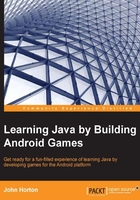
What this book covers
Chapter 1, Why Java, Android, and Games?, tells us why we might choose Java, Android, and games over other languages, platforms, and types of apps. Then we quickly prepare our Android and Java development environment by installing the Java Development Kit and Android Studio.
Chapter 2, Getting Started with Android, shows us how to design, build, and run a game menu UI on a real Android device. This is the first part of our math game project.
Chapter 3, Speaking Java – Your First Game, covers the Java fundamentals and their use in an Android environment to make a simple math quiz game.
Chapter 4, Discovering Loops and Methods, contains more Java fundamentals such as decision-making and looping. Then we use them to add features to our math game. This chapter also covers some basic Android game essentials such as locking and handling screen rotation, and introduces the device sensors.
Chapter 5, Gaming and Java Essentials, takes us on a quick ride through some vital essentials for any game. We also make the UI more exciting with animation and by storing player scores. Demonstrated with a Simon-style memory game, storing the sequence with Java arrays and a for loop.
Chapter 6, OOP – Using Other People's Hard Work, is the chapter where everything you have learned so far is tied up with a pretty ribbon. You should find yourself muttering phrases like, "Oh, I see" and "So that's how it works." We explore object-oriented programming (OOP) in this chapter.
Chapter 7, Retro Squash Game, teaches us how to draw graphics pixel by pixel with the Android Canvas class. We can then combine these new skills with what we already know and make a retro, pong-style squash game.
Chapter 8, The Snake Game, covers the beginning of our most advanced game project—an animated Snake-style arcade game. We will also be able to practice more of the important Java fundamentals that you learned in the previous chapters.
Chapter 9, Making Your Game the Next Big Thing, puts the icing on the cake by teaching you how to publish your game and add online leaderboards and achievements. This will also let you examine the concept of Java libraries.
Appendix, Self-test Questions and Answers, contains all the answers to the questions to test your understanding of the topic.